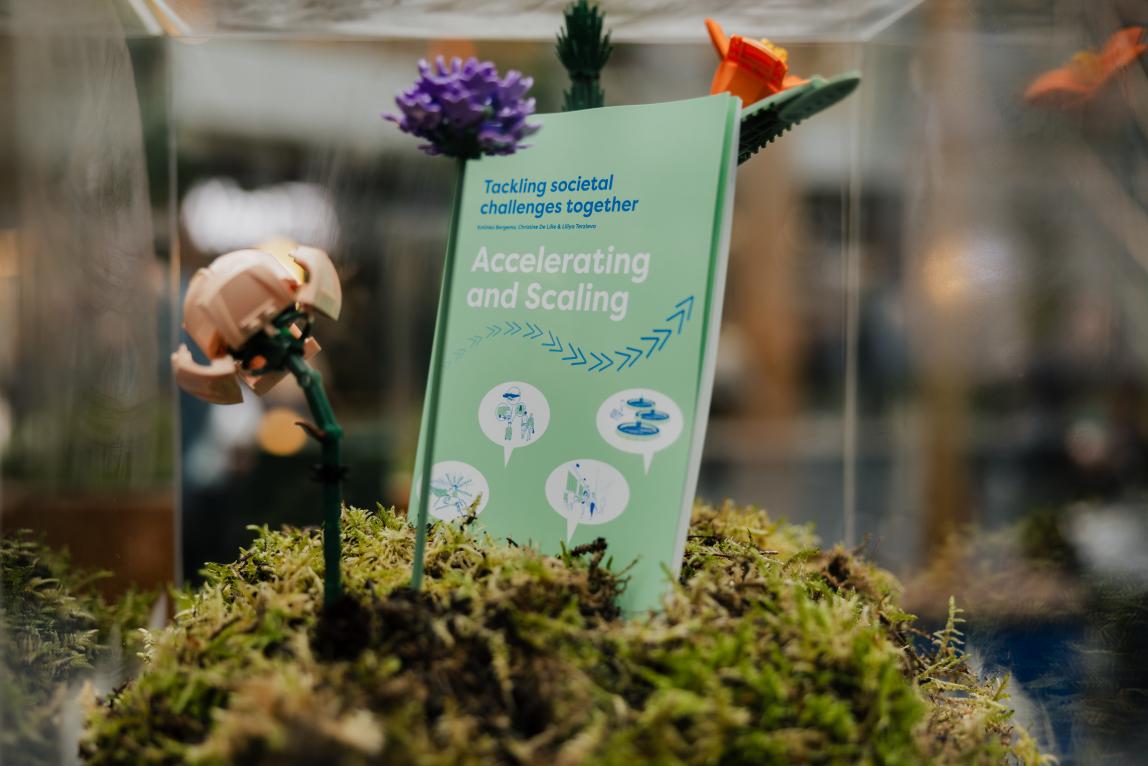
I am INTERNATIONALisation
10/17/2024 - 10:33
- Uncover
Author: Liliya Terzieva is professor of Designing Value Networks at the Hague University of Applied Sciences.
The first encounter with it was through language – the realisation you might find yourself incapable of relating due to the lack of the necessary ’words’, context, culture… and this happened as early as at the age of three (with the Russian comrades we had in kindergarten) or from what I clearly remember somewhere around the age of four or five, when the ’secret’ (due to the communist restrictions at that time) family friends from Germany (DDR) visited us when they came to enjoy the Black Sea in Bulgaria. Yes, words, language, interaction, acknowledging and respecting the difference and existence of others, this is where internationalisation grew in me and stayed, found a place and flourishes actively today.
Professorship of Designing Value Networks
This is particularly noticeable in my role today as a professor of Designing Value Networks at the Hague University of Applied Sciences, the Netherlands, where my mission as the leader of a research group is to allow for, enable and empower value to come to the forefront. This is achieved by fostering collaborative, sometimes even contradictory, yet complementary interactions among actors both within and beyond a system. Our primary objective is twofold: first, to contribute to knowledge development; and second, to design and generate expertise in applied models. These models enable organisations and professionals to sustain impact and foster innovation in an ecosystem context.
Reframing interactions in a collaborative format has become vital for designing futures that hold value. Therefore, the need to explore the essence of value networks through mapping out tools through nodes (members) and connectors is embedded in the framework of the Centre of Expertise Mission Zero where transitioning to a society of a new order has embraced internationalisation as central from the very first moment (being open to people of all kinds, endeavours of all cultures and processes of any nature).
And what is certainly to be emphasised is that we are connected more than ever, not only because of digitalisation and AI but also because of the intrinsic desire to discover, to step into the unknown, to understand, to thrive and to empower.
We live together and through this togetherness new realities can emerge, new networks can be sustained, and the true significance of scaling and acceleration becomes apparent. Only when we abandon prejudice, generalisation, the weight of history, and closed doors to the future, can true progress occur. And yet, it is essential to maintain and safeguard – realistically so – the memory of our collective diversity, the richness of our experiences and the abundance of resources we each contribute. This happens when we remain open to listening, truly hearing one another, embracing our differences, and, when necessary, extending forgiveness.
Valuing my time at BUas
My individual pathway has always been nurtured by internationalisation (being born and growing up in Bulgaria, stepping out on an educational and research journey to China, diving into the pre-accession and EU funding opportunities while on a quest with the Bulgarian Chamber of Commerce and Industry – which definitely required an international entrepreneurial mindset, exploring the Mediterranean melting pot of cultures in Malta, empowering tourist professionals in Vietnam, etc.). The 11 years I spent at Breda University of Applied Sciences, the Netherlands, can certainly be seen as a highlight in this respect. Having had the privilege of guiding international master’s students (the MBA Master Imagineering, Master Strategic Events Management, Master Leisure and Tourism Studies) from at least eight different nationalities on an annual basis; co-designing and generating knowledge, practice and expertise hand-in-hand with people from 15 different cultural contexts and doing research across continents was more than I could have ever desired or dreamed of.
Internationalisation is far from being merely fulfilling and enriching. It is a bumpy road where the scars from falling and getting up again serve as constant reminders of the challenges faced along the way. There is a ‘sweet pain’ in venturing beyond the comfort zone, yet an unwavering longing to continue the journey, seeking understanding and meaning. BUas provided me with the opportunity to develop, manage and implement, together with a team, projects with partners in Austria, Poland, Spain, Slovenia, Germany, Bosnia and Herzegovina, Serbia, Montenegro, Chile, Peru, Thailand, Myanmar, to name a few. I have had the unique opportunity to engage in research and create publications with researchers from almost all of the aforementioned countries. Together, we have forged new pathways in education for the next generation, aimed at an inviting and open future, even if it remains unknown.
Internationalisation is that element – ’the fifth’, the UMAMI, which reframes, reshapes, reconnects, revisits and rejoices – just leave the door open for it or simply make it the ever-open window to be able to fly from.
This article was published in Uncover Magazine - Internationalisation. You can read the complete magazine via this link.